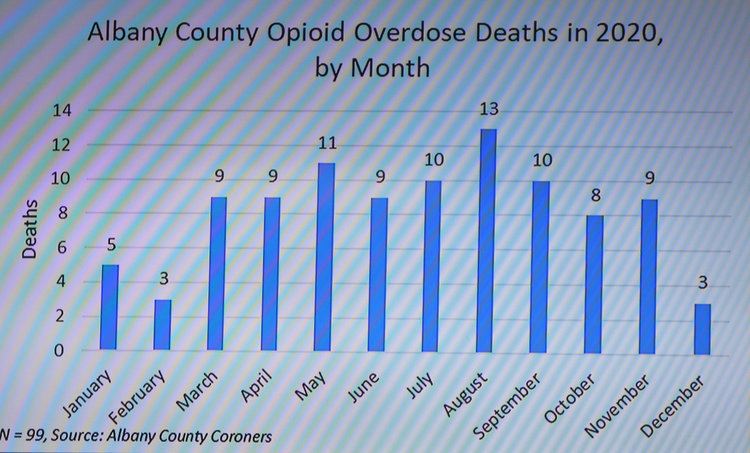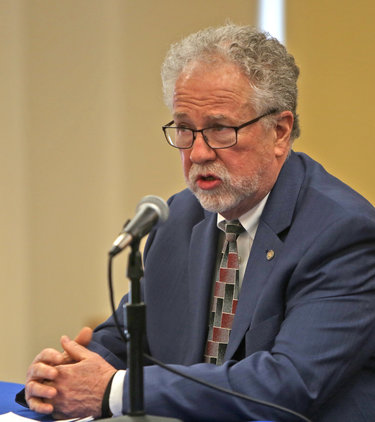Deaths from drug overdoses surge with pandemic
ALBANY COUNTY — Albany County is part of a national trend as drug-overdose deaths have surged in the midst of the pandemic.
Ninety-nine deaths were caused by opiate overdoses in Albany County last year, a jump from 62 in 2019.
“The progress we made going forward in curbing this took a step back,” said Albany County Executive Daniel McCoy at a press conference on Feb. 10.
The number of overdoses in Albany County for 2020 represents a 68-percent increase from the annual average over the last five years. Fentanyl — a synthetic opioid pain reliever that is increasingly illicitly manufactured — was present in 88 percent of all county opioid overdoses last year.
The Centers for Disease Control and Prevention has reported over 81,000 overdose deaths in the United States between May 2019 and May 2020.
“That’s the highest number ever reported in a one-year period,” said McCoy.
He spoke of the “ripple effect” COVID-19 has had across the county with increased domestic violence and suicides as well.
“These are things no one wants to talk about,” he said.

Stephen Giordano, Ph.D., who directs the county’s mental-health department, called it “an epidemic within the pandemic.
“The good news …,” said Giordano, is that, “as a community we are more resilient than we ever imagined we would be. I think we’ve learned that you only know your strength when you’re tested to your limits and we certainly, as a community on every front, have been tested to our limits.”
He went on, though to describe the “not-so-good news”: “We’ve been injured as a community and it’s not only in terms of the daily reminders of the physical and medical injuries that we’ve sustained as a result of this pandemic.
“It’s our mental health, our emotional well being. Our spirit I think has been injured. The healing will likely take a long time and I think we’re still not yet fully seeing the peaks of this injury.”
Although with the decreasing infection rates and the administration of vaccines there are “glimmers of hope on the medical front,” Giordano said, “We still have many fears on the behavioral health front.”
One indicator of that injury, he said, is the “really dramatic rise” in the number of opioid deaths.
“Vulnerable people are susceptible to this incredible confluence of stressors in the mental-health world, in the addiction world, and pre-existing conditions can worsen,” he said just as non-existing conditions can emerge.
The 99 overdose deaths in 2020 is the highest ever annually for Albany County, Giordano said. The victims were primarily males in their thirties. The group as a whole ranged in age from 20 to 59, he said.
Giordano noted that not all of the overdoses that occurred in Albany County were county residents; 86 percent of the 99 were residents, he said.
Following a national trend, over 85 percent of the deaths, he said, were related to opioid-related fentanyl, which he said the county has been watching since 2012.
According to data from the National Forensic Laboratory Information System, confiscations, or seizures, of fentanyl increased by nearly seven fold from 2012 to 2014.
“One of the big changes is that the fatalities are more and more likely related to illicitly produced synthetic opioids like fentanyl,” Giordano said. This could be in combination with drugs like cocaine, he said, noting a spike in fentanyl-laced cocaine in Schenectady.
“But, for me, the only way to keep doing this kind of work …,” said Giordano, “you have to find hope in all of this. And I want to give you just a little bit of what I think is reason to be hopeful.”
While deaths are an indicator of the injury, he pointed to indicators of the community’s strength in its legions of caregivers.
Giordano also put the 99 opioid deaths in the context of the 2,748 people in Albany County who are receiving addiction treatment.
“That’s a large number; it’s a scary number but it’s a remarkable number,” he said, “and I think it’s a hopeful number.
Of those 2,748 county residents, almost 60 percent, he said, are suffering from an opioid-related disorder.
“I think it’s important to say: 15,066 people did not die today. They’re in treatment, they’re in recovery, and they’re working on this … The tragic numbers associated with the fatalities are wake-up calls to us and to all the folks that I work with and that work for me.”
Giordano said that almost 90 percent of people receiving treatment from Albany County for opioid-related disorders “are receiving state-of-the-art, evidence-based” treatment with medication. He stressed, “Treatment is available in this community. Treatment works … Recovery is possible.”
He praised Governor Andrew Cuomo’s budget proposal for “integrating the addiction and mental-health community at the state level.” Giordano said, “In Albany County, we integrated our mental-health and addiction services five or six years ago” The goal, he said, is to treat people with multiple problems in a holistic way.
“We’re moving towards expanding some of our local outreach work,” he said. This will go beyond responding to overdoses and will offer treatment and support.
Alluding to Albany County’s COVID-19 death toll of over 330, Giordano concluded, “If we had lost 300 people in a single event, it would be a mass casualty. We’re trained to help in that regard. We certainly welcome calls from grieving family members or folks who are trying to find their way through this difficult time”
****
Albany County residents who need help with addiction recovery and prevention treatment may call the 24/7 Capital Region Open Access Engagement Program at 1-866-930-4999 or the New York State Office of Alcoholism and Substance Abuse Services hotline at 1-877-8-HOPENY.
For residents experiencing stress, anxiety, or depression during the pandemic, the Albany County Mental Health Support Line is available seven days a week, from 8 a.m. to 5 p.m. at 518-269-6634. Anyone experiencing a psychiatric emergency should still call the Albany County Mobile Crisis Team at 518-549–6500.
The 24-hour sexual assault hotline number is 518-447-7716, and the free and confidential online text chat feature can be found at the link here.
More information is online at the Albany County Department of Mental Health webpage.



